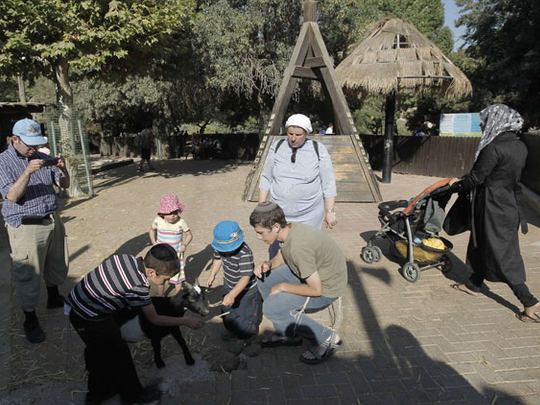
Occupied Jerusalem: Gripping the guardrail by a small lake in Jerusalem’s Biblical Zoo, six-year-old Zeinab and seven-year-old Tali gaze in fascination at Siamang gibbons swinging from vines and screeching at visitors.
After a while, the girls turn away and join their respective families picnicking a few metres from each other on the lawn nearby.
The now-sprawling zoo, founded in 1939 when the country was still under British mandate, was set up with the aim of gathering together all the animals mentioned in the Bible.
It has also brought together two groups who rarely rub shoulders at recreational sites in the Holy City — Jewish and Palestinian families.
“Here Jews and Palestinians mix, we work together,” said zoo staffer 20-year-old Ulfat Abu Katish who greets visitors with a broad smile at the zoo’s main gate.
“We forget politics for a moment, even though each has his own ideas and no one is willing to give them up,” said Katish, in a purple headscarf as well as the dark green t-shirt worn by all employees at the zoo.
Young Zeinab has come with her parents Sherihan and Mohammad Abu Sbitan, from Al Tur on the Mount of Olives in largely Palestinian occupied east Jerusalem.
And Tali, who lives in the ultra-Orthodox Jewish neighbourhood of Geula, is with her sister Shira, 16, who is watching over her five younger siblings.
“We do everything to accommodate our Palestinian visitors. Our explanatory notes are translated into Arabic and many of the zoo staff are Palestinians, especially among the guides,” said Sigalit Dvir-Hertz, a spokeswoman for the zoo.
Originally set in occupied central Jerusalem, the zoo was founded by the late Aharon Shulov, a professor considered one of the pioneers in zoology at Hebrew University.
It switched locations several times, notably after the Palestinian-Israeli war in 1948 — the year the state of Israel was created and a milestone in the conflict over land ownership that still opposes the two sides today.
In 1993, the zoo moved to its current home, 25 hectares on the slopes of a sweeping valley overlooked by pine-covered hills in occupied south Jerusalem.
The facility has preserved several species of animals that are mentioned in scripture but considered endangered in the modern-day Holy Land, including the Asian lion, the Syrian brown bear, the cheetah and the Nile crocodile.
It has even reintroduced some species back into the wild, notably the fallow deer.
More than 120 species of animals are named in the Bible, according to Dvir-Hertz who said it is difficult to give an exact figure because the ancient Biblical names are not always accurate.
Dozens of these are represented in the zoo today.
The lush vegetation of the site was also carefully selected from the trees and plants spoken of in the Bible, the spokesman said.
But even the relaxing pastoral setting of manicured lawns, flower beds and waterfalls is not always enough to break down years of mutual suspicion and barriers between Jews and Palestinians.
“A Palestinian family? Where?” asked Shira, the ultra-Orthodox teenager babysitting her siblings and pretending not to notice the Abu Sbitans sitting under a tree nearby.
Throughout the park, there are countless references to the Zionist ideas of Jews returning to their ancestral lands.
Yet Mohammad, a security guard, said “it’s nice here.”
“I come mainly for my daughter to have fun on the grass and to see the animals,” he said with little Zeinab perched on his lap.
“If the Jews speak to me I reply, but the conversation ends there. Everyone goes their own way, with their family. We don’t really have contact,” he said.
There are also hints of disharmony among the staff at the zoo.
“There is no conflict between Jewish and Palestinian workers, but as usual in Israel there is wage discrimination against the Palestinians,” said one embittered gardener, speaking to AFP on condition of anonymity.
“When there is peace the Palestinians will be treated the same as the Jews.”












